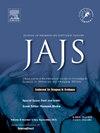Trabecular Metal Augments for Reconstruction of Acetabular Bone Defects in Revision Total Hip Replacement: Short-Term Outcomes
Q4 Medicine
引用次数: 0
Abstract
Revision hip surgeries are increasing dramatically nowadays, and achieving hip center of rotation is challenging. Obtaining a press-fit implant and restoring the hip’s center of rotation might be difficult during the restoration of acetabular deformities during revision total hip arthroplasty (THA). The aim of the study was to evaluate the outcomes of using trabecular metal augments for reconstruction of the acetabulum in patients undergoing revision THA with short-term follow-up. This study was conducted in Benha University Hospital between April 2019 and March 2023. It is a prospective cohort study including 20 patients who are undergoing revision THA with acetabular defects. The mean age of patients in this study was 59 years old. According to Paprosky classification: 45% of type 2B. The postoperative Oxford Hip Score showed marked improvement in the outcomes, the score was excellent in 55% (11 patients), good in 40% (8 patients), and fair in only 5% (1 patient) over 16 months’ mean follow-up period. Due to its modularity, tantalum augments are considered a valuable method in the reconstruction of acetabular defects.用于重建翻修全髋关节置换术中髋臼骨缺损的骨小梁金属假体:短期疗效
如今,髋关节翻修手术急剧增加,实现髋关节旋转中心具有挑战性。在翻修全髋关节置换术(THA)中修复髋臼畸形时,可能很难获得压合植入物并恢复髋关节旋转中心。 本研究的目的是通过短期随访,评估在接受翻修全髋关节置换术的患者中使用骨小梁金属假体重建髋臼的效果。 本研究于 2019 年 4 月至 2023 年 3 月期间在本哈大学医院进行。这是一项前瞻性队列研究,包括20名接受翻修THA手术的髋臼缺损患者。 患者的平均年龄为59岁。根据Paprosky的分类:45%为2B型。术后牛津髋关节评分结果显示,在平均 16 个月的随访期内,55% 的患者(11 名)的疗效明显改善,40% 的患者(8 名)疗效良好,仅有 5% 的患者(1 名)疗效一般。 由于其模块化的特点,钽增量材料被认为是重建髋臼缺损的重要方法。
本文章由计算机程序翻译,如有差异,请以英文原文为准。
求助全文
约1分钟内获得全文
求助全文
来源期刊

Journal of Arthroscopy and Joint Surgery
Medicine-Orthopedics and Sports Medicine
CiteScore
0.60
自引率
0.00%
发文量
1
期刊介绍:
Journal of Arthroscopy and Joint Surgery (JAJS) is committed to bring forth scientific manuscripts in the form of original research articles, current concept reviews, meta-analyses, case reports and letters to the editor. The focus of the Journal is to present wide-ranging, multi-disciplinary perspectives on the problems of the joints that are amenable with Arthroscopy and Arthroplasty. Though Arthroscopy and Arthroplasty entail surgical procedures, the Journal shall not restrict itself to these purely surgical procedures and will also encompass pharmacological, rehabilitative and physical measures that can prevent or postpone the execution of a surgical procedure. The Journal will also publish scientific research related to tissues other than joints that would ultimately have an effect on the joint function.
 求助内容:
求助内容: 应助结果提醒方式:
应助结果提醒方式:


